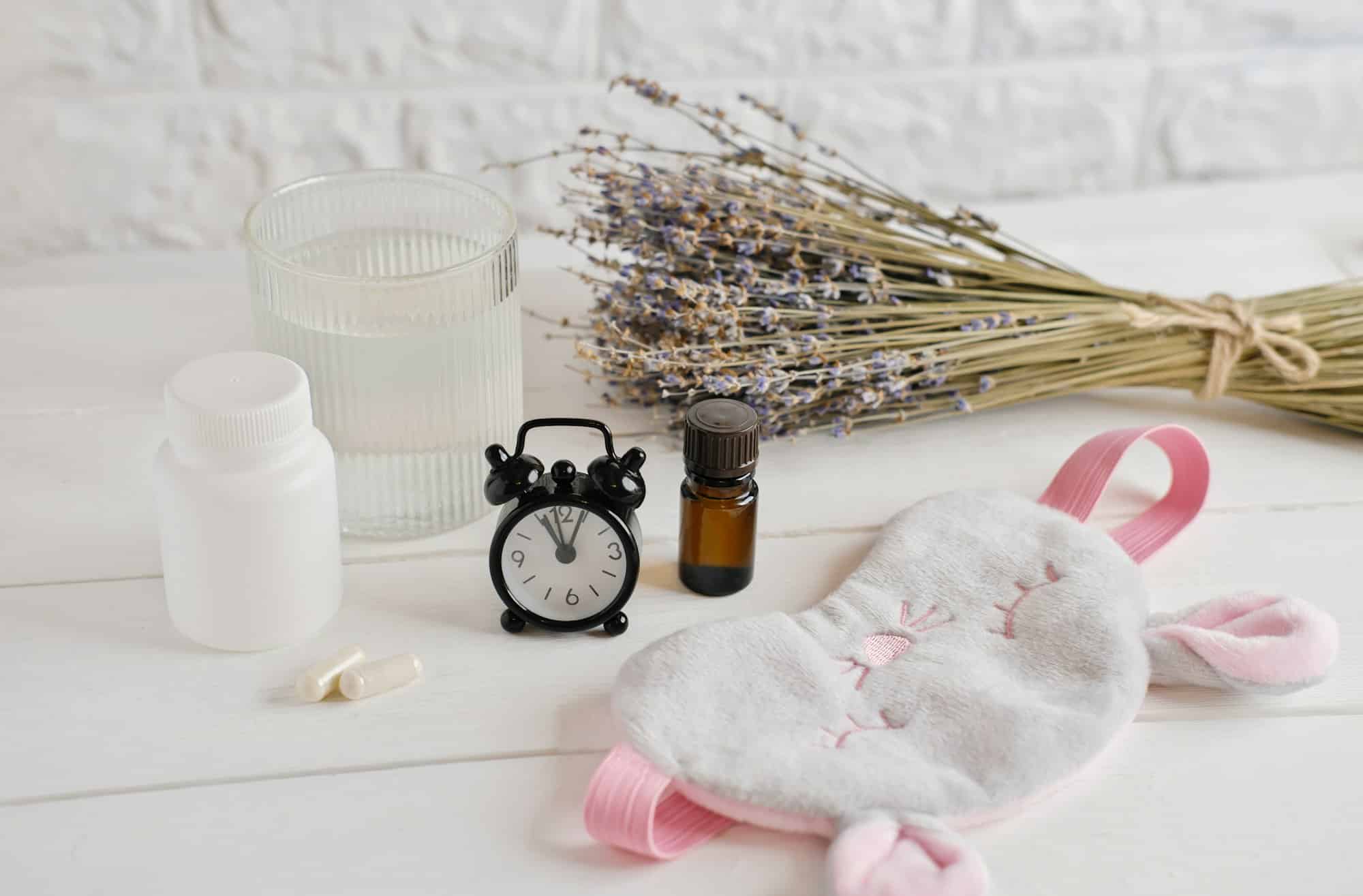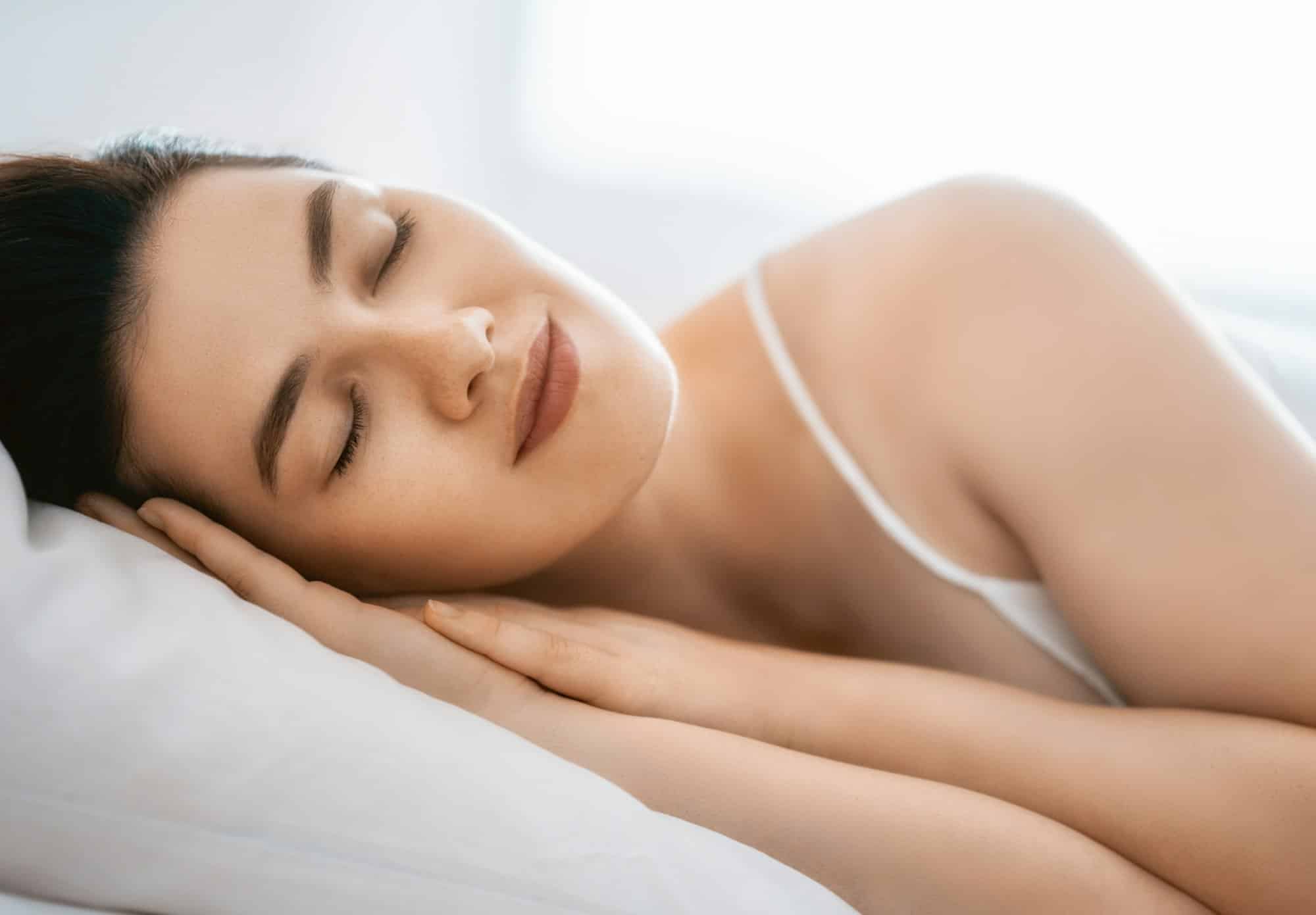Melatonin is a hormone that is important for a good night’s sleep.
It is made by a special gland in the brain called the pineal gland and is turned on by darkness, and off by sunlight. It helps regulates our “circadian rhythm,” or the rhythm of the sun by controlling our internal time clock and setting our individual sleep-wake cycles. It plays a critical role in getting the right amount of sleep for a healthy lifestyle.
Melatonin is also sold as an over-the-counter supplement, and per the National Sleep Foundation survey in 2022 is used by more than 25 % of all U.S. adults making it the most popular sleep aide on the market. Researchers say that adding melatonin to our diet may also improve sleep.
Melatonin supplements work best for sleep problems or insomnia that impacts the sleep-wake cycle including jet lag, night shift workers, and people with delayed sleep patterns or night owls.
How does Melatonin help with sleep?
Melatonin is a hormone that helps with sleep by putting you in a state of calm or “quiet wakefulness.” It is turned on or boosted by “darkness,” to help us sleep at night.
The sunlight or lack of sunlight acts directly on the retina of the eye which is the light-sensitive layer of the eye that tells the brain when to make melatonin.
That is why it is important not to have direct light at least 2 hours before going to sleep at night including watching television before bedtime or having blue or green light stimulation from using the computer, smart phones, tablets or other cellular devices as this stimulates the light-sensitive area of the eye shutting off melatonin and stopping us from having a restful night’s sleep.
If you need to use your computer or devices before bedtime, a filter to screen out blue or green wavelengths may be helpful or having your TV screen at least 6 feet away while viewing.
How can I boost Melatonin levels?
Levels of melatonin are increased during periods of darkness and decreased during periods of light. And, in fact, it is as important to “shut off,” melatonin in the daytime as helps “boost,” melatonin at night.
An excellent way of doing this is to get direct sunlight exposure in the morning and afternoons by taking walks. This will help shut of melatonin so it can be saved when you need it the most at night to fall asleep.
This is why in places like Alaska, our energy levels are lower in the winter because there is not a lot of natural sunlight in the day, so melatonin is made in the day leading to daytime sleepiness. This may worsen depression and difficulty sleeping at night.
Also, adding melatonin containing foods can also be helpful in promoting sleep including warm milk before bedtime, eating dinner with fish high in omego-3-fatty acids like salmon and sardines, eggs, and cherry juice. In fact, tart cherry juice is one of the best-known sleep aides. Drinking tart cherry juice or eating cherries with dinner or before bedtime can help with sleep.
Do I have enough Melatonin to sleep?
Yes, melatonin can be measured in the blood, urine (pee), and saliva (spit) but is not a common test. In order to make sense of the result, it must be compared by age and sex. Melatonin “peaks,” at puberty and then continues to decrease as we age with higher levels in women than men.
In fact, melatonin has been linked to other conditions outside of the sleep wake cycle and low levels have been linked to obesity, diabetes, and certain neurological conditions like dementia and Parkinson’s disease.
Interestingly, in people where the pineal gland (the gland in the brain that makes melatonin) has been taken out this has led to faster aging and thus scientists feel melatonin may have anti-aging benefits as well.
A recent article, in June 2024, at Case Western found that regular consumption of melatonin reduces the chance of a getting an eye disease common in the elderly called age related macular degeneration which can lead to blindness and effects over 11 million people in the U.S.
Can I stop being a night owl?
Yes, if you stay up late and wake up late, melatonin may help you fall asleep faster and get up earlier feeling refreshed. If it takes you more than 2 hours to fall asleep especially if you have the habit of stay up until 2 am to 6 am and sleep until 10 am to 1 pm, melatonin foods or supplements before bedtime may help you reset.
It is best to take melatonin about 1 hour before going to bed, and remember also to dim the lights, relax, and avoid exciting activities or exposure to light including TV’s, cell phones, social media, and computer devices.
Start with the lowest does of melatonin and slowly increase every week to the desired result with maximal dose of 10 milligrams per dose. Rule of thumb is to always use and start with the lowest dose to avoid bad side effects including headaches, nausea, mild tremors, and worsening of blood pressure.
Once you have mastered your sleep cycle then try weaning off melatonin as is not intended for long term daily use.
Can Melatonin help with jet leg?
Yes, melatonin can help after a long plane trip that crosses time zones. It will help you adjust your “circadian,” clock to get you back on track with your regular sleep cycle.
When you arrive at your destination take melatonin at your normal bedtime in that time zone and can repeat if needed for 5 nights in a row. A dose as small as 0.5 milligrams seems just as effective as a dose of 5 milligrams although some studies say higher dose works better. Take the melatonin 30 minutes to 1 hour before you are ready to sleep or ask your doctor about the best time to take. You can also start taking melatonin before you fly to adjust your sleep cycle.
It is also important to help reset your internal time clock by exposure to natural light in the morning. Nothing is more powerful than daytime light with the reset. Morning light exposure helps adjust to earlier time zones after travelling east especially if you have travelled east through may time zones, say from Hawaii to New York.
Any other sleep advice?
Melatonin or any other sleep aide may not be effective especially in people with chronic insomnia or poor sleep hygiene due to reasons outside of a poor sleep cycle. So best to review your sleep habits before taking supplements. Also, lack of sleep may be a sign of another serious health problem so always best to consult your doctor before taking any new supplements.
Too much caffeine including coffee, tea, chocolates and caffeinated beverages, or other prescription medications may be affecting your ability to get a good night sleep so try to switch to non-caffeinated beverages and review your medications with your doctor. Also, anxiety or racing thoughts may also impair sleep and may respond best to behavioral sleep therapy or other medications. In addition, how comfortable your bed is, lightening, noise and temperature of the room impacts the quality of sleep that likely will not be helped by taking melatonin.
Melatonin is not a “magic pill,” but can be used in the short term as a sleep aide and best at helping with lack of sleep or insomnia due to jet lag, night workers needing daytime sleep, or resetting circadian sleep rhythms due to being a night owl. However, outside of sleep there may be a role of melatonin in treating and preventing macular degeneration of the eye, and the process of aging.
If you have any questions reach out and AskDoctorH.




 Have Questions? AskDoctorH
Have Questions? AskDoctorH